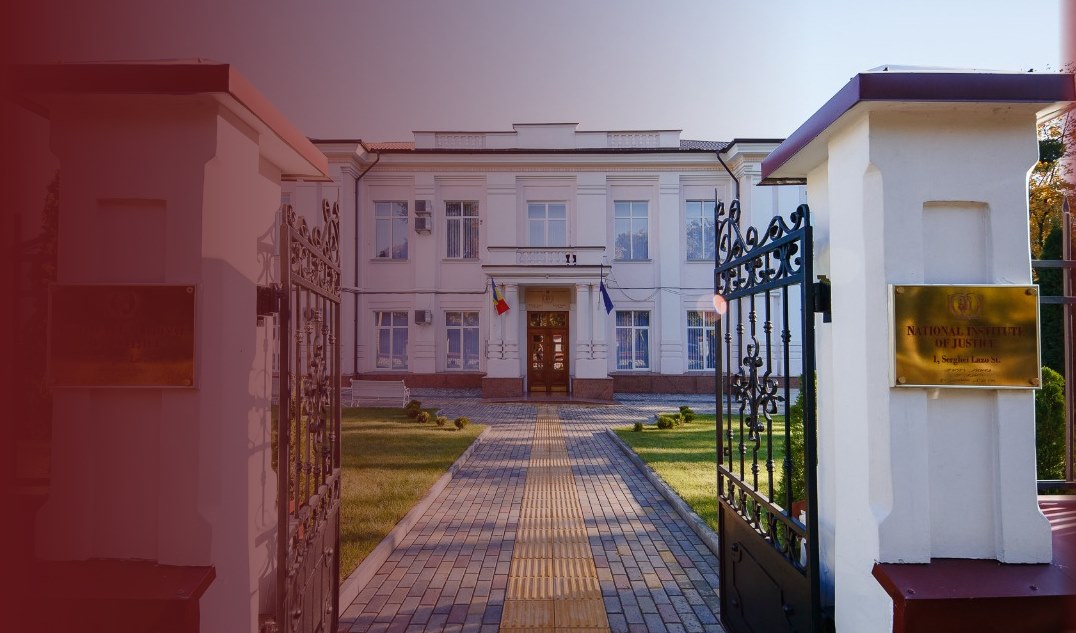The National Institute of Justice was established pursuant to Law No. 152-XVI of 08 June 2006 on the National Institute of Justice.
As per the provisions of the law, the National Institute of Justice has the following main competences:
- initial training of the candidates to the positions of a judge and prosecutor;
- continuous training of acting judges and prosecutors;
- continuous training of court registrars, judicial assistants, heads of court chancelleries, prosecutors’ consultants, probations officers, attorneys involved in state-guaranteed legal assistance;
- organization and carrying out the exams for individuals who candidate to the positions of a judge or prosecutor based on duration their employment service.
In addition, the Instituted has the following competences:
- initial and continuous training, on a contractual base, of other individuals who act in the area of justice, as these are provided by the law;
- international cooperation in the relevant areas of activity;
- scientific research studies in the area of human rights and justice, their publishing together with other didactic and methodological documents drafted as part of Institute’s activity.
Furthermore, the Institute performs training of initial trainers with the purpose of contributing to the improvement of efficiency and effectiveness of the Institute’s training activity.
The decision-making bodies of the Institute are its Council and the Director.
The initial componence of the NIJ’s Council had held its first meeting on 4 August 2006 at the premises of the Ministry of Justice. This meeting was opened by Elena Mocanu, Deputy Minister of Justice. Mihai Martinenco – Deputy President of the Penal Panel of the Supreme Court of Justice – has been appointed as the Chairman of the Council, while Eugenia Fistican – judge at the Supreme Court of Justice – has been appointed as the secretary of the Council.
The meeting of the NIJ’s Council of 17 October 2006 was held with the purpose of appointment, on a competition basis, of the Executive Director of the NIJ. Eugenia Fistican has been appointed to this position, for a period of 5 years, being simultaneously seconded, by a decision of the Supreme Council of Magistrates from the position of the judge at the Supreme Court of Justice.
The idea of establishing of a national institution to be in charge for assuring the professional level of the judges, prosecutors and other individuals who contribute to the administration of justice, for the first time, was considered in 2003 when, through Decision of the Parliament of the Republic of Moldova No. 415-XV of 24 October 2003, the National Action Plan in the area of human rights for a period of 2004-2008 has been approved.
The idea of creation of the National Institute of Justice of the Republic of Moldova has been actively promoted by the Council of Europe. The Council of Europe has been permanently preoccupied of the professional level of the judges and other individuals who contribute to the administration of justice in the area of human rights and fundamental liberties, taking into account their essential role to the justice.
The most relevant recommendations on the professional education of the judges and prosecutors, providing for the highest level of quality of the justice which, all together, are considered to be forming the relevant standards of the Council of Europe, are:
- Recommendation no. R (94)12. Of the Committee of Ministers to Member States. On the Independence, Efficiency and Role of Judges. (Adopted by the Committee of Ministers on 13 October 1994 at the 518th meeting of the Ministers' Deputies);
- Recommendation Rec (2000)19 on the Role of Public Prosecution in the Criminal Justice System (Adopted by the Committee of Ministers on 06 October 2000);
- Notice No. 4 of the Consultative Council of European Judges (CCEJ) on the Initial and Continuous Training of the Judges and Prosecutors on the European and the National Levels (of 27 November 2003).
It should be noted that the Law of the Republic of Moldova on the National Institute of Justice follows the European model which had proven its efficiency in time, while the Council of Europe was promoting this initiative from its very beginning and offered all the necessary support for its implementation in the Republic of Moldova. During the period of 2001-2007 this subject matter has been included with all justice reform activities in the Republic of Moldova held with the participation of the experts of the Council of Europe. An important number of the activities designed for the establishing the NIJ has been planned and implemented by the Council of Europe, in special within its joint programs with the European Commission. As a result of these activities, some details recommendations regarding the duly establishing and functioning of the NIJ, necessary legal framework, amendments to be brought to the existing legal framework, drafting of the modern curricula, technical equipment and headquarters of the NIJ has been provided.
